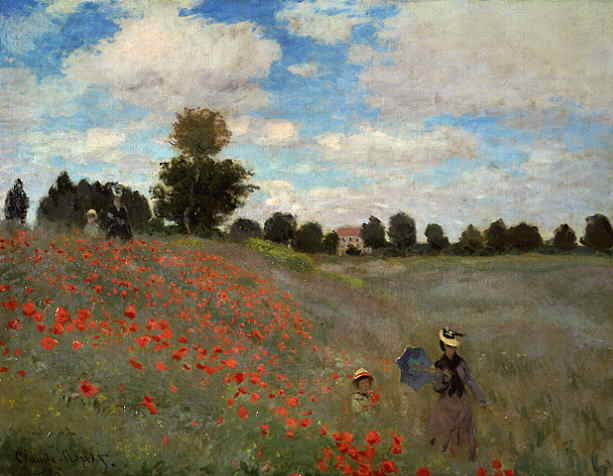Poppy
Papaver rhoes

Poppy is a common name referring to the flower or plant of any number of genera within the family Papaveraceae. Most people think about the flowers in the genus Papaver, in which there are over 100 species, including the corn poppy (aka Flanders poppy, aka Red poppy), the opium poppy (occasionally called the white poppy, which can also be red), and the Iceland and Oriental poppies (common garden cultivars)…
The poppy most commonly encountered and available to use is the red poppy (Papaver rhoes). The other well-known Papaver species is the opium poppy which, at least in the US, is illegal for growing without a permit, according to the Poppy Control Act of 1942) and from which opium and opium derivatives originate.
In the language of flowers, the poppy is a symbol of eternal sleep, oblivion, imagination and creativity. The red poppy carries the extra meaning of pleasure, the white poppy symbolizes consolation, and the yellow poppy, wealth or success. Modernly, poppies are also a symbol of remembrance for those killed in battle, largely as a result of the poem In Flanders Fields by John McRae.
Poppies have been around for quite some time…some accounts suggest that they were used, and even cultivated as far back as the Stone Age. They are found almost world wide and show up in the mythos of multiple cultures. Poppy remnants were found in an ancient Egyptian tomb, and poppies feature in several myths of the Assyrians, Gerrks and Romans. Like many plants, poppies were introduced across the Roman Empire. The Minoan culture featured a goddess wearing a garland of poppies in her hair, and poppies in Christian art can represent both the blood of Christ on the cross and/or Christ’s death prior to his resurrection.
While the opium poppy is well known for its medicinal properties and had been mentioned in medical texts attributed to both Galen and Hippocrates, P. rhoeas is not very well known, and information about its medical use is a bit sketchy and contradicts with other information. Some accounts suggest that P. rhoeas is a much milder, and non-narcotic version of its cousin, while most suggest that there is no medicinal use for the plant at all. I have been unable to find any clinical documentation of the use of P. rhoeas. Personally, poppy is not a plant I would would use medicinally (much less give medicinal advice on)…after watching the MythBuster’s episode, I wouldn’t even eat lemon poppy seed muffins (my favorite) if I worked somewhere that was able to make me pee in a cup at their leisure (like the military).

 As far as using the poppy in magic, I have seen it referenced for use in spells dealing with agriculture, abundance, fertility, invisibility, clairvoyance, divination, remembrance, love, luck, money, sleep, and death. Supposedly poppy seeds, burned as incense promote female fertility, and attract love, good luck and money and eating bread made with poppy seeds on the first day of the New Year is supposed to bring a year of abundance. A form of inviting divinatory dreams is reported to involve removing the seeds from the seed capsule placing a question written on the piece of paper into it and putting the pod underneath the pillow, supposedly the answer will come in a dream that night.
As far as using the poppy in magic, I have seen it referenced for use in spells dealing with agriculture, abundance, fertility, invisibility, clairvoyance, divination, remembrance, love, luck, money, sleep, and death. Supposedly poppy seeds, burned as incense promote female fertility, and attract love, good luck and money and eating bread made with poppy seeds on the first day of the New Year is supposed to bring a year of abundance. A form of inviting divinatory dreams is reported to involve removing the seeds from the seed capsule placing a question written on the piece of paper into it and putting the pod underneath the pillow, supposedly the answer will come in a dream that night.
Unlike the medicinal qualities which are quite different between the opium and corn/red/flanders poppy, it is often hard to differentiate which poppy is meant for various uses. Most correspondences appear to refer to the opium poppy, but it seems the symbolism varies dependent on the culture and time period.
Magical Correspondences:
Gender: Feminine
Element: Water, earth
Planet: Moon, Mercury
Deities: Demeter, Kore, Hypnos, Thanatos, Nyx, Somnus, Ceres, Aphrodite
Poppy in Ancient Greece:
Greek : Mêkôn
Species : Papaver rhoeus and Papaver somniferum
Description : A bright red spring and summer flowing perennial. The ancients apparently planted it in their crop rotations to revitalise the soil. It was also naturally found growing amongst the wheat fields. Opiates were extracted from the seed of the opium poppy variety.
Sacred to : Demeter (poppy flowers were used for festive adornment, and a cake baked with poppy-seeds featured in her mysteries; opiates may also have been used in some of her Mystery cults), Hypnos (the god of sleep dripped poppy juice, i.e. opium, from his wand)
Mythology : Metamorphosis Mekon. Mekon was a youth loved by the goddess Demeter. Following his premature death she transformed him into a poppy flower.
